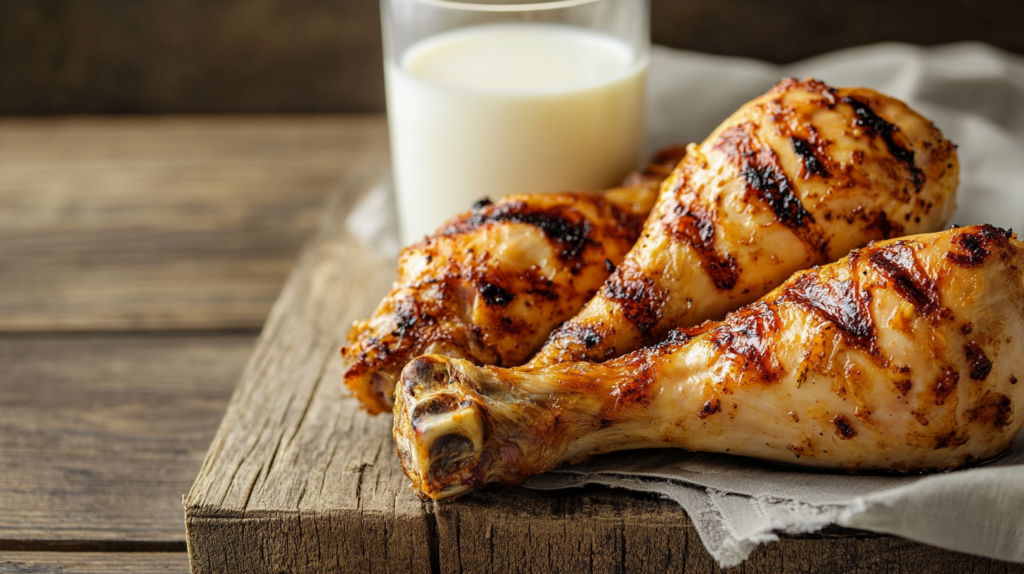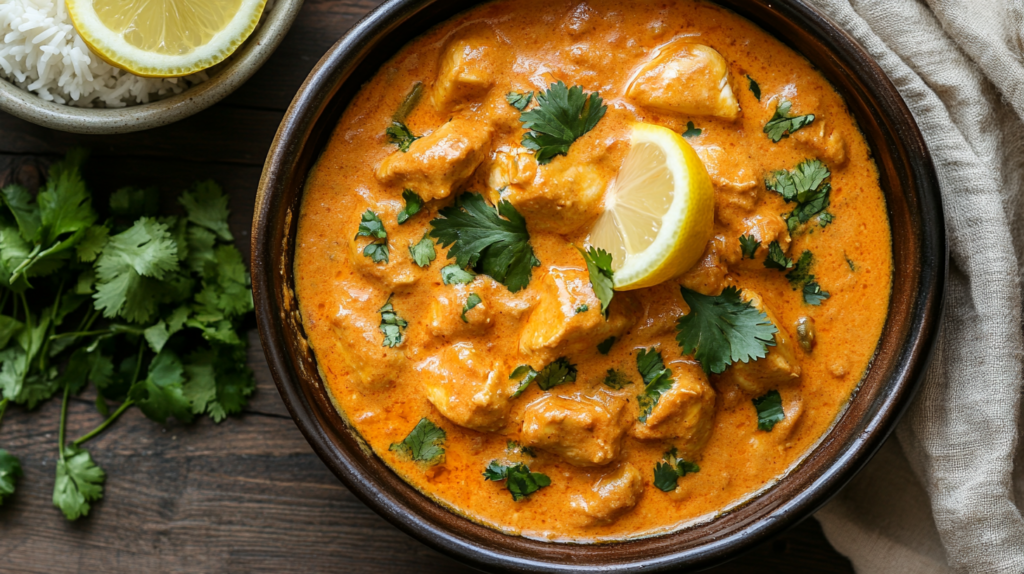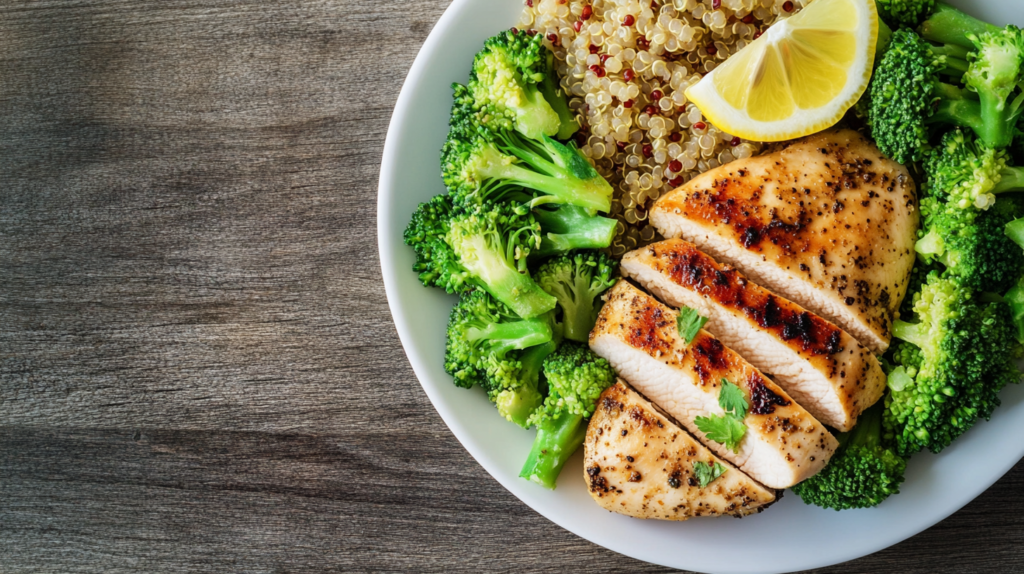Chicken is a popular dietary staple loved worldwide for its taste, versatility, and nutritional value. It provides a lean source of protein, vitamins, and minerals that promote muscle growth, immune health, and overall wellness. However, knowing what foods to avoid pairing with chicken is important, as some combinations can harm digestion, reduce nutrient absorption, or affect flavor.
Knowing what not to eat with chicken isn’t just about personal taste—it’s about making sure the foods we eat work well together to support our health. Pairing the wrong foods with chicken can cause discomfort, lower nutritional value, and even lead to health problems. In this article, we’ll look at foods to avoid with chicken, the reasons behind these guidelines, and the cultural beliefs that support these practices.
Table of Contents
Foods to Avoid When You Eat Chicken
Dairy Products: Why You Should Not Eat Chicken with Milk, Cheese, or Yogurt
Combining chicken with dairy products like milk, cheese, or yogurt is a common dietary mistake. Understanding what not to eat with chicken is essential, as these combinations can negatively affect digestion. Many traditional health systems, including Ayurveda, recommend avoiding such pairings to prevent the production of toxins in the body.
- Reason: Chicken is a rich source of protein, and dairy contains casein, a protein that may interfere with the digestion of meat. Together, these proteins can overwhelm the digestive system, causing bloating or discomfort.
- Example: Eating chicken curry prepared with excessive cream or yogurt may feel heavy and cause digestive distress for some people.
Why You Should Not Eat Chicken with Fish and Seafood
Chicken and seafood are both excellent sources of protein, but it is better to eat them separately. Combining these two animal proteins is not recommended because it might cause digestive issues.
- Reason: Chicken and seafood differ in their digestion times and nutritional compositions. Combining them may increase the risk of indigestion and even food poisoning if not cooked and stored properly.
- Example: Avoid dishes like chicken and prawn stir-fry, as the combination may not sit well with sensitive stomachs.
Fruits: Citrus and Acidic Varieties
People often consider fruits healthy and refreshing, but eating acidic fruits like oranges, lemons, or grapefruits with chicken can disrupt digestion.
- Reason: Citrus fruits are highly acidic and may cause the proteins in chicken to coagulate, making it harder for the body to digest the meal. This combination can also lead to acid reflux in some individuals.
- Example: Chicken dishes marinated excessively in lemon juice may taste tangy but can cause acidity when eaten in large quantities.
Pulses and Beans
Pulses and beans, though nutritious, are not the best partners for chicken in a single meal. Their high fiber content can slow down the digestion of chicken protein.
- Reason: The combination of animal protein and plant-based fiber can cause bloating and discomfort, especially for individuals with sensitive digestive systems.
- Example: A dish combining chicken and lentil stew may feel heavy and take longer to digest, causing post-meal sluggishness.
Alcohol: Specific Considerations
Alcohol, particularly strong spirits, is another item that doesn’t pair well with chicken. While many enjoy pairing wine or beer with chicken dishes, certain combinations can be problematic.
- Reason: Alcohol can irritate the stomach lining, and when consumed with protein-heavy foods like chicken, it may lead to indigestion or acid reflux. Moreover, the metabolism of alcohol can interfere with the absorption of nutrients from the meal.
- Example: Drinking whiskey with fried chicken may amplify feelings of acidity or discomfort after the meal.
Health Reasons to Avoid Certain Foods When You Eat Chicken

Impact on Digestion
One of the most significant reasons to understand what not to eat with chicken is the negative impact certain food combinations can have on digestion. The human digestive system works optimally when foods with similar digestion times and properties are paired together. Consuming incompatible foods with chicken can strain the digestive process and lead to discomfort.
- Slowed Digestion: Combining chicken with high-fiber foods like beans or pulses can cause a delay in digestion. Proteins in chicken require acidic stomach conditions for breakdown, while fiber-rich foods need a more alkaline environment. This mismatch can lead to incomplete digestion, bloating, and discomfort.
- Acid Reflux: Acidic foods like citrus fruits or alcohol can exacerbate symptoms of acid reflux when consumed with chicken. The protein in chicken increases the stomach’s acid production, and additional acidity from other foods can create a burning sensation or heartburn.
Potential Food Allergies and Sensitivities
Certain food combinations can increase the likelihood of allergic reactions or sensitivities, even if the individual ingredients are safe to consume on their own.
- Allergic Reactions: Mixing chicken with seafood, such as shrimp or fish, can potentially increase the risk of cross-reactivity in individuals sensitive to certain proteins. This can cause mild symptoms like itching or more severe reactions such as difficulty breathing.
- Sensitivities to Dairy: For those who are lactose intolerant, consuming chicken with dairy-based sauces or creams may amplify symptoms like bloating, gas, or diarrhea due to the presence of both lactose and heavy proteins.
Nutrient Absorption Interference
Proper nutrient absorption is crucial for maintaining a balanced diet, and incompatible food combinations can hinder this process.
- Calcium and Iron: Dairy products like milk and cheese have calcium, which can block the absorption of iron from chicken. This is important for people with iron deficiency, as eating these foods together makes iron less available to the body.
- Protein Efficiency: Chicken is a good quality protein source, but combining it with other heavy protein foods, such as pulses or fish, may overwhelm the body’s ability to process them effectively. This can lead to a decreased overall protein intake.
Increased Toxin Formation
According to Ayurvedic principles, improper food combinations can lead to the formation of toxins (ama) in the body, which can manifest as fatigue, skin issues, or digestive disorders.
- For example, some believe that combining chicken with yogurt, a common practice in certain cuisines, increases mucus production and slows digestion, especially in individuals with sensitive stomachs.
Risk of Food Poisoning
Certain combinations, especially involving animal proteins, can increase the risk of foodborne illnesses if proper cooking and storage guidelines are not followed.
- Cross-Contamination Risks: Preparing chicken and fish together increases the risk of cross-contamination. This can cause food poisoning if either protein is not cooked properly.
- Bacterial Growth: Proteins like chicken and dairy, when stored or cooked improperly, can harbor bacteria such as Salmonella or Listeria. Combining them in a dish heightens the risk if food safety precautions are overlooked.
Cultural and Traditional Perspectives on What to Eat with Chicken
Food pairing guidelines are deeply rooted in cultural and traditional beliefs, emphasizing what to eat with chicken and what to avoid. Some of these practices align with modern nutritional science. Let’s explore how different cultures approach pairing chicken with other foods to maintain health and balance.
Ayurvedic Views on What to Eat with Chicken
Ayurveda, an ancient Indian system of medicine, emphasizes the importance of balancing foods based on their taste, energy, and post-digestive effects.
- Incompatible Foods: According to Ayurveda, chicken is considered a “hot” food, meaning it generates heat and energy in the body. Pairing it with “cold” foods, like yogurt or certain fruits, can create an imbalance in the digestive system, leading to toxins (ama) and reduced vitality.
- Yogurt with Chicken: While chicken curry with yogurt is a popular dish, Ayurveda suggests consuming this combination sparingly or with spices that aid digestion, such as ginger or cumin.
Chinese Medicine on What to Eat with Chicken for Balance
Traditional Chinese Medicine (TCM) also highlights the importance of harmonious food pairings to maintain the body’s balance of yin (cooling) and yang (heating) energies.
- Chicken as a Yang Food: Chicken is considered a yang food that warms the body and promotes energy. Pairing it with yin foods, like cooling fruits or seafood, can lead to digestive discomfort or reduced health benefits.
- Avoiding Dairy: Traditional Chinese Medicine (TCM) generally discourages pairing dairy with chicken. Practitioners believe this combination produces excessive dampness in the body, which can lead to respiratory or digestive issues.
Examples of Cultural Restrictions on What to Eat with Chicken
Many cultural traditions have specific rules about what people can and cannot eat with chicken. These guidelines are often rooted in centuries of observation and experience.
- Islamic Dietary Practices: Some Islamic cultures recommend avoiding chicken and fish together because of health and digestion concerns.
- Jewish Dietary Laws: Kosher dietary laws strictly prohibit mixing meat, including chicken, with dairy. This rule reflects modern observations that combining these two food groups can create digestive challenges.
- Eastern European Traditions: In Eastern European cultures, people often eat chicken soup on its own or with simple carbohydrates. They avoid adding acidic fruits or heavy dairy to the dish to ensure easier digestion.
What to Eat with Chicken for Optimal Nutrition
While it’s essential to avoid certain foods with chicken, many others pair well, enhancing its nutritional profile and flavor.
Vegetables: Nutrient-Packed Pairings
Vegetables are among the best options to pair with chicken, offering a balance of fiber, vitamins, and minerals.
- Leafy Greens: Spinach, kale, or arugula add a nutrient-dense, low-calorie component to chicken dishes. They also support healthy digestion and provide antioxidants.
- Root Vegetables: Carrots, sweet potatoes, and beets pair well with chicken, offering a touch of natural sweetness and a boost of vitamins like A and C.
- Cruciferous Vegetables: Broccoli, cauliflower, and Brussels sprouts are excellent for enhancing the nutritional content of a chicken-based meal.
Healthy Carbs: Rice, Quinoa, and Sweet Potatoes
Adding complex carbohydrates to chicken dishes creates a balanced and satisfying meal.
- Brown Rice and Quinoa: These whole grains provide fiber and essential nutrients, helping maintain energy levels and supporting digestion.
- Sweet Potatoes: Their natural sweetness complements chicken, and they are rich in beta-carotene and fiber.
Herbs and Spices for Flavor and Health
Herbs and spices not only enhance the flavor of chicken but also contribute health benefits.
- Turmeric and Ginger: These spices improve digestion and have anti-inflammatory properties, making them ideal for chicken marinades or curries.
- Garlic and Onion: Rich in antioxidants, these aromatics enhance chicken dishes while promoting heart health and immunity.
- Herbs like Rosemary and Thyme: These add fragrance and a depth of flavor to roasted or grilled chicken, while also offering antioxidants.
Common Myths and Misconceptions

Myths and misconceptions often influence food pairing and dietary guidelines. People have passed down many beliefs about eating chicken through generations, while others come from misunderstandings of science.
Dispelling Myths About Chicken and Milk
One of the most common myths is that consuming chicken and milk together causes severe health issues, such as skin conditions or digestive problems.
- Fact Check: There is no scientific evidence to support the claim that chicken and milk are inherently harmful when consumed together. However, individuals with lactose intolerance or sensitive digestion may experience discomfort due to dairy rather than the combination itself.
- Cultural Belief: Some traditions avoid this combination because of Ayurvedic principles or religious practices, which highlight the incompatibility of animal proteins with dairy.
Understanding “Cold” and “Hot” Food Theories
The concept of “cold” and “hot” foods originates from traditional medicine systems like Ayurveda and TCM, which categorize foods based on their effects on the body rather than their temperature.
- Chicken as a “Hot” Food: Many people believe chicken warms the body and boosts energy. Pairing chicken with “cold” foods, like yogurt, cucumber, or certain fruits, can create an imbalance that leads to digestive issues or weakened immunity.
- Modern Perspective: Although these ideas come from tradition, modern science suggests that such combinations may simply feel heavier to digest without causing any lasting harm.
Myths About Combining Chicken and Fish
Another widespread belief says that people should not eat chicken and fish together due to risks of poisoning or allergic reactions.
- Fact Check: Eating chicken and fish together is generally safe as long as both are cooked thoroughly and stored correctly. This belief likely stems from cultural traditions or worries about cross-contamination, which can happen without proper precautions.
- Modern Insight: Although it is safe to eat them together, it’s better to avoid combining them in one dish to preserve their unique flavors and textures.
The Role of Food Pairing in Nutritional Value
A misconception is that food pairings significantly change the nutritional value of meals, making them harmful or beneficial.
- Fact Check: Food pairings can affect digestion and absorption of certain nutrients but do not fundamentally alter the nutritional composition of chicken or its accompaniments. For instance, pairing chicken with dairy may reduce iron absorption but does not “cancel out” the iron in chicken.
- Example: Pairing chicken with leafy greens, which are high in Vitamin C, actually enhances iron absorption—a principle supported by nutritional science.
Overstating the Harm of Acidic Foods
The belief that acidic foods, such as citrus fruits, can ruin a chicken dish or harm digestion is exaggerated.
- Fact Check: While acidic foods can make chicken proteins harder to digest for some people, they are not inherently harmful. Many cuisines use lemon or vinegar as marinades to tenderize chicken and enhance its flavor without causing issues when eaten in moderation.
- Culinary Practice: Chefs worldwide use acidic ingredients like lemon or tomatoes in chicken dishes, suggesting that such combinations are not harmful when properly balanced.
Frequently Asked Questions
Why should I avoid milk with chicken?
Milk and chicken are thought to have incompatible digestive requirements, which could lead to indigestion in sensitive individuals. However, there is no conclusive evidence that the combination is universally harmful.
Can I eat chicken with citrus fruits?
Avoid eating too many acidic fruits with chicken, but using citrus fruits like lemon in moderation as a marinade enhances flavor and is widely accepted.
Is combining fish and chicken harmful?
Not inherently. However, due to their contrasting flavors and textures, many prefer to keep them separate. Check out Is It Good to Eat Chicken for Breakfast? for light morning meal ideas.
What are the best food pairings with chicken?
Chicken pairs well with nutrient-rich sides like vegetables and whole grains. You can find creative options in Chicken Breakfast Recipes.
Can eating chicken with alcohol cause health issues?
Yes, consuming chicken with alcohol may lead to digestive discomfort or acid reflux, as alcohol can irritate the stomach lining. Choosing lighter alcoholic beverages like wine over spirits can minimize this risk.
What spices complement chicken best?
Spices like turmeric, ginger, garlic, paprika, and black pepper are excellent for enhancing the flavor of chicken while also offering health benefits such as improved digestion and anti-inflammatory properties.
Conclusion
Understanding the best and worst combinations with chicken ensures healthier and more enjoyable meals. Avoiding risky pairings and focusing on complementary foods can enhance both flavor and nutrition. For further tips on managing your chicken pairings, explore Can I Drink Coffee After Eating Chicken?.
By focusing on compatible pairings—such as vegetables, whole grains, and nutrient-rich spices—you can create balanced and delicious meals that maximize chicken’s health benefits. Cultural and traditional practices offer valuable insights into food combinations, but modern science allows for flexibility and personal choice. Whether you’re preparing a simple chicken salad or a flavorful curry, understanding these guidelines will help you make informed and satisfying culinary decisions.

